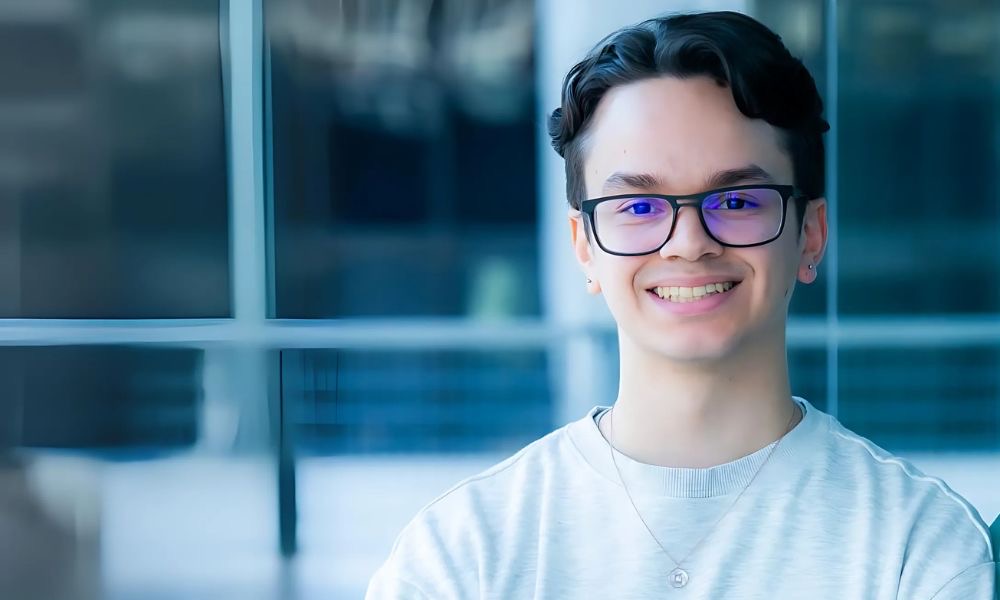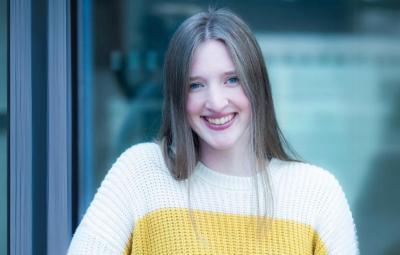
Major: B.S. in Toxicology
Minor: Environmental Justice
Mentor: Dr. Anthony Carpi, Vice Provost and Dean of Research; Dr. LaDawn Haglund, Associate Professor of Climate Justice
Programs: PRISM, Honors Program, Macaulay Honors College, CUNY Immersive Research Experience (CIRE), Ronald E. McNair Scholars Program
Internships/Fellowships: Education Fellow with Educated Choices Program
Hometown: Middletown, NY
Career Aspiration: Environmental Studies Professor
What was life like before John Jay College?
My family is from Puerto Rico and Cuba and I’m the youngest of three kids. Growing up I was very focused on school. Even though neither of my parents graduated from college, going to college was something embedded in my brain that I had to do.
I was raised in a very Catholic, Latino household and I struggled coming to terms with my sexuality. I didn’t understand what I wanted to be or who I was. I came out to my parents three times, but it just wasn’t something we would talk about. Most of our conversations focused on school and my future success. My mom is a chemist for the Food and Drug Administration and got me into science. On career days, I remember her coming into my classroom and doing little science experiments with the class. Everybody said she was so cool. The two of us bonded over science experiments at home. I credit her for introducing me to the world of science.
Why John Jay?
My mom went to John Jay when she was pregnant with me. She always talked about these amazing professors she had and what a big part of life the school was for her. Because of my mom, John Jay was always on my radar. I like to think that I’m helping fulfill her dream by graduating from John Jay. Getting my diploma and walking across that stage will be a shared success with her and my whole family.
What sparked your passion for environmental issues?
In high school, I watched a lot of films about environmental problems, like Erin Brockovich and Dark Waters. They exposed me to the reality of industrial pollution and the effect pollutants have on marginalized communities. When I came to John Jay, I took a biology class that touched on environmental restoration and ecology. I found it extremely interesting. When I was feeling overwhelmed by my new surroundings, I would often go to the library to take a breather from the world around me. One time, I walked straight into this random stack of books about the environment. I ended up reading all of them that semester. During my second semester, I got an email about a fellowship program teaching students about environmental issues. I was the youngest fellow in the program and the experience was transformational. I learned so much and fell in love with teaching young people about the environment. I didn’t believe in destiny, but I have to believe that all these events pointed me in the right direction.
How have your mentors put you on the path to success?
I’ve had nothing but great experiences with Dr. Carpi but I was nervous before contacting him for the first time. I’d read some of his research articles and asked him a few questions about his work. He responded right away and invited me to one of his lab meetings—which surprised me and got me excited. At the meeting, I got to see how closely he works with his students. Now that I’m working with him directly, what I really appreciate is that he’s always there if you have questions and he trusts you to work independently.
He’s been a huge help with the Ph.D. application process. He helped me narrow down exactly what I wanted to do, and which programs would work best for me. He made me question what I wanted to study and whether the subject would be in demand in the future. Seeing his dedication is a big motivation for me. When I become a professor, I hope to be like him.
Can you tell us about your research?
I’m leading a project in the mercury lab. Mercury is a toxic chemical that’s found throughout the environment—even in places you wouldn’t think it was there. What I’m looking at right now are mercury emissions from soil. The work is important because mercury in the atmosphere can pass the blood-brain barrier in humans and impact the central nervous system, causing health issues and even death. My goal was to identify the specific gene in the bacteria from our soil that helps convert mercury into a form that can escape from the soil and enter the atmosphere. We found the gene in four different soil samples from Connecticut, Massachusetts, New York, and Pennsylvania.
What has your CIRE experience been like?
CIRE really amplifies the resources we have at John Jay. We’re exposed to a broad range of research topics and methods. Now that I’m applying to Ph.D. programs, the more intense and personal guidance from CIRE has really helped. I get to work with Dr. Carpi a lot more and it’s turned our relationship into something that’s more level. I see him as a researcher and he sees me as a researcher. We’re having more conversations where I feel very professional and confident in my opinions.
A program like CIRE is super important because it allows underrepresented students to research subjects that directly impact us. Our perspectives matter and doing research gives us a voice, especially on environmental issues. Marginalized populations—which are often people of color—are the most vulnerable and most impacted by climate change. The opportunity to conduct this research has helped me be an advocate for my community.
The financial component of CIRE is also critical. Students can focus on their research instead of picking up a second job to support themselves and their families. For someone like me, who’s paying rent in the city, the stipend is a huge help. It allows me to focus on my research and applying to Ph.D. programs.
Where do you see yourself in 10 years?
I see myself working as a professor and a researcher. I want to do all I can to promote equal access to fresh air, clean water, and clean food. I want to inform policy decisions that positively impact society. I want to be a professor who teaches students about environmental topics in ways they’ve never considered before. And, I want to instill confidence in the next generation of climate scholars and environmental advocates.



